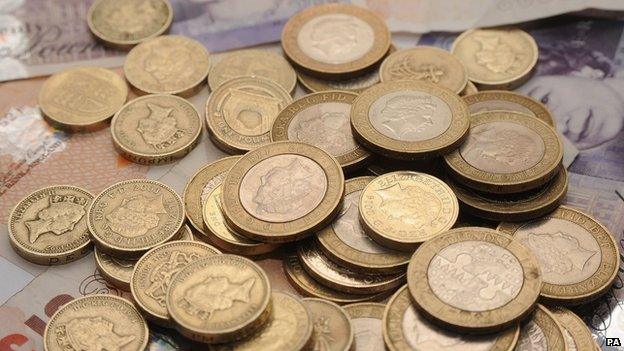Reality Check: Are Tories planning biggest cuts?
- Published

Ed Miliband has said that under the Tories: "Britain would be facing the deepest cuts over the next three years of any advanced country in the world." Is he right?
Labour have based the claims on . The IMF sets out how budget deficits and surpluses compare across several countries. These figures are "cyclically-adjusted" to ignore the peaks and troughs of economic cycles to show the underlying deficit.
Looking at cyclically-adjusted figures is a reasonable thing to do. And the IMF provides useful data that sets out how the public finances in different countries compare.
As Labour says, between 2015 and 2018, the UK sees its deficit fall further than other countries.
However, the time frame that Labour look at is significant. Labour have decided to focus on just a three-year period. That is because the independent Office for Budget Responsibility (OBR) has said that the squeeze on spending in these years, followed by an increase in spending afterwards, will lead to a roller coaster ride for the UK finances. Actually, the OBR talks about the period up to and after, 2017-18, but the IMF provides figures in calendar years not financial years.
But from an economic perspective, this is an arbitrary time frame to choose. For example, if you stretch out the period and take 2011 as a starting point, then other countries see steeper reductions in their deficits, including Greece, Ireland and Singapore.
A second problem is that making direct comparisons may be unfair. Some countries that ran high deficits might have already been forced to impose severe austerity measures - so the hard work has already been done. Other countries may face serious spending squeezes over the coming years but just haven't set out their plans yet.
A third problem is that Labour has taken these figures and concluded that a sharp reduction in the deficit would mean severe spending cuts. We know that the Conservatives want to eradicate the deficit during the next parliament. We also know that the Conservatives want to rely mainly on spending cuts to close the deficit - looking for 拢30bn of savings from unprotected government departments (all bar education, health and foreign aid).
But there are other ways to reduce a deficit aside from spending cuts (including increasing taxes and raising money through clamping down on tax avoidance).
Labour has said that the IMF's figures are actually quite generous to the Tories as they don't take into account the Conservatives' pre-election pledges to lower taxes in the next parliament, which would increase the deficit.
Both Labour and the Conservatives have been criticised for not providing full details of their spending plans and we don't yet know how successful any policies will be in reducing the deficit. Also, the OBR figures are based on Coalition plans, not just Conservative ones.
So, as we don't yet know the details of all the Tories' plans, Labour is probably stretching the argument a little in saying that a fast-deficit reduction programme automatically means spending cuts and hence that the Tories are planning the biggest cuts in the world.
Election 2015 - Reality Check
What is the truth behind the politicians' claims on the campaign trail? Our experts investigate the facts, and wider stories, behind the soundbites.
Read latest updates or follow us on Twitter